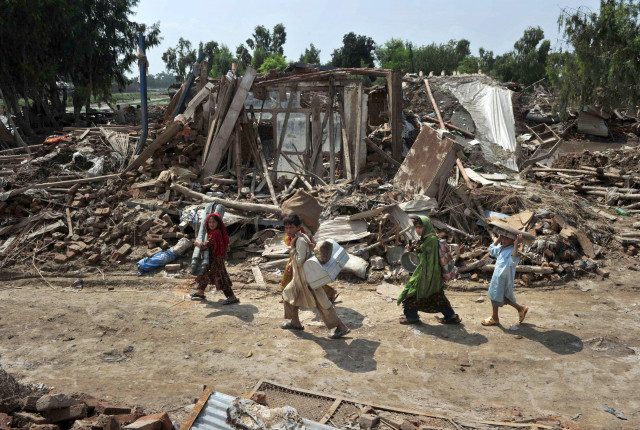IOM to assess damage to flood-zone houses
IOM plans to launch project to assess damage to houses in Pakistan's flood zone.

IOM to assess damage to flood-zone houses
The pilot project will be conducted in Khyber-Pakhtunkhwa, Punjab and Sindh and will facilitate 300 families for a month. “The assessment will help us determine what purchases of products we need to make from local markets used for reconstruction and rehabilitation of houses such as wood, timber, doors, window frames, etc,” Chris Lom of the IOM told The Express Tribune.
“We are already late in terms of catering to the winterisation needs of those in the north,” Lom said. The needs of the south, according to him, will differ from the needs in the north, but we do require warm clothing for the upcoming months in the south. “After the pilot project we will be able to assess what exactly is needed.”
According to National Disaster Management Authority (NDMA) estimates, 1.9m houses have been damaged or destroyed. The shelter cluster has managed to reach only 20% of 2.7 million people that need emergency shelter. Cluster agencies have managed to reach 384,500 households with emergency shelter since early August. According to IOM, there is a gap of 1.25 million families or 8.75 million people who need emergency shelter and have yet to receive it.
Sindh remains an area of concern for the agencies. NDMA estimates that over 1.1 million homes have been either damaged or destroyed in the province. To date the cluster agencies have only managed to reach 61,000 of these families with emergency shelter which is just 6 per cent of the families that need shelter. There are tents and plastic sheeting currently ordered by cluster agencies and in the procurement pipeline which will increase the number of families that receive emergency shelter from 20 per cent to about 36 per cent.The reason that these percentages of needs met are rising slowly is because the need for emergency shelter is still rising in Sindh.
Stacey Winston from UN Office for the Coordination of Humanitarian Affairs said the number of people affected has changed due to the displacement in Sindh. An estimated 14 million are in need of emergency assistance. “Disaster is on going in the south and early recovery in K-P has begun,” added Winston.
The UN office noted that the number of people staying in schools has now fallen below 700,000. Jacqueline Koch of the NGO Merlin says “malaria is right on the horizon and we are hopeful that water-borne diseases lessen. But when people go back they will be going back to unclean water. Sindh remains a concern.”
Published in The Express Tribune, September 29th, 2010.
This article has been revised to reflect the following correction:
Correction: November 11, 2010
The original article incorrectly spelt Jacqueline Koch's name as Jacqueline Crook. This error has been corrected above.



















COMMENTS
Comments are moderated and generally will be posted if they are on-topic and not abusive.
For more information, please see our Comments FAQ